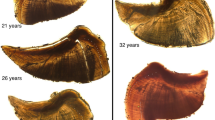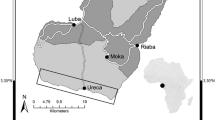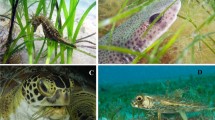Abstract
Water management practices in tidal marshes of the San Francisco Bay Estuary, California are often aimed at increasing suitable habitat for threatened fish species and sport fishes. However, little is known about how best to manage habitat for other sensitive status species like the semiaquatic freshwater Western Pond Turtle (Actinemys marmorata) that is declining throughout much of its range. Here, we examined the basking activity, abundance, survival, and growth of Western Pond Turtles at two brackish water study sites in Suisun Marsh, California that differed in how they were managed, with one having passive management (i.e., no active water regulation) and another having active management (i.e., water regulated for seasonal hunting). Our results revealed that basking activity was greatest when salinity, water stage, and air temperatures were low, shortwave radiation was high, and wind levels were intermediate. These preferred habitat characteristics often reflected conditions that were naturally maintained at the passively managed, muted tidal site. We also found that turtles were more abundant and had higher survival rates in the passively managed habitat compared to the actively managed habitat (201–323 turtles/km2 and 96% survival versus 11–135 turtles/km2 and 77% survival, respectively). Finally, characteristic growth constants from von Bertalanffy models showed that turtles grew more quickly in passively managed habitat compared to the actively managed habitat. Our results suggest that management strategies for this sensitive status species may be more effective if they protect passively managed muted tidal systems that limit or delay extreme cycles of salinity and water levels and conserve elevated terrestrial buffer zones adjacent to muted and full tidal systems.





Similar content being viewed by others
References
Agha M, Ennen JR, Bower DS, Nowakowski AJ, Sweat SC, Todd BD (2018) Salinity tolerances and use of saline environments by freshwater turtles: implications of sea level rise. Biol Rev 93:1634–1648. https://doi.org/10.1111/brv.12410
Agha M, Yanagitsuru YR, Fangue NA, Nowakowski AJ, Kojima LV, Cech Jr JJ, Riley MK, Freeman J, Cocherell DE, Todd BD (2019) Physiological consequences of rising water salinity for a declining freshwater turtle. Conserv Physiol 7(1):coz054. https://doi.org/10.1093/conphys/coz054
Bridgham SD, Megonigal JP, Keller JK, Bliss NB, Trettin C(2006) The carbon balance of North American wetlands. Wetlands 26:889–916. https://doi.org/10.1672/0277-5212(2006)26[889:TCBONA]2.0.CO;2
Bluett RD, Cosentino BJ (2013) Estimating occupancy of Trachemys scripta and Chrysemys picta with time-lapse cameras and basking rafts: a pilot study in Illinois. Usa Ill State Acad Sci Trans 106:15
Bluett RD, Schauber EM (2014) Estimating abundance of adult Trachemys scripta with camera traps: accuracy, precision and probabilities of capture for a closed population. Trans Illinois State Acad Sci 107:19
Boyer DR (1965) Ecology of the basking habit in turtles. Ecology 46:99–118. https://doi.org/10.2307/1935262
Bower DS, Scheltinga DM, Clulow S, Clulow J, Franklin CE, Georges A (2016) Salinity tolerances of two Australian freshwater turtles, Chelodina expansa and Emydura macquarii (Testudinata: Chelidae). Conserv Physiol 4:cow042. https://doi.org/10.1093/conphys/cow042
Bulté G, Blouin-Demers G (2010) Estimating the energetic significance of basking behaviour in a temperate-zone turtle. Ecoscience 17:387–393
Burke VJ, Gibbons JW (1995) Terrestrial buffer zones and wetland conservation: a case study of freshwater turtles in a Carolina bay. Conserv Biol 9:1365–1369. https://doi.org/10.1046/j.1523-1739.1995.09061365.x
Burnham KP, Anderson DR (2004) Multimodel inference: understanding AIC and BIC in model selection. Sociol Methods Res 33:261–304. https://doi.org/10.1177/0049124104268644
Byrd KB, Flint LE, Alvarez P, Casey CF, Sleeter BM, Soulard CE, Flint AL, Sohl TL (2015) Integrated climate and land use change scenarios for California rangeland ecosystem services: wildlife habitat, soil carbon, and water supply. Landsc Ecol 30:729–750. https://doi.org/10.1007/s10980-015-0159-7
Cadi A, Joly P (2003) Competition for basking places between the endangered European pond turtle (Emys orbicularis galloitalica) and the introduced red-eared slider (Trachemys scripta elegans). Can J Zool 81:1392–1398. https://doi.org/10.1139/z03-108
Carpenter B, Gelman A, Hoffman MD, Lee D, Goodrich B, Betancourt M, Brubaker M, Guo J, Li P, Riddell A (2017) Stan: a probabilistic programming language. J Stat Softw 76:1. https://doi.org/10.18637/jss.v076.i01
Crawford KM, Spotila JR, Standora EA (1983) Operative environmental temperatures and basking behavior of the turtle Pseudemys scripta. Ecology 64:989–999. https://doi.org/10.2307/1937806
Ernst CH (1972) Temperature-activity relationship in the painted turtle, Chrysemys picta. Copeia 217–222. https://doi.org/10.2307/1442479
Ernst CH, Hershey MF, Barbour RW (1974) A new coding system for hard-shelled turtles. Trans Ky Acad Sci 35:27–28
Ernst CH, Lovich JE (2009) Turtles of the United States and Canada. JHU Press, Baltimore, MD, USA
Ficetola GF, Padoa-Schioppa E, Monti A, Massa R, Bernardi FD, Bottoni L (2004) The importance of aquatic and terrestrial habitat for the European pond turtle (Emys orbicularis): implications for conservation planning and management. Can J Zool 82:1704–1712. https://doi.org/10.1139/z04-170
Gatten Jr RE (1974) Effects of temperature and activity on aerobic and anaerobic metabolism and heart rate in the turtles Pseudemys scripta and Terrapene ornata. Comp Biochem Physiol Part A Physiol 48:619–648. https://doi.org/10.1016/0300-9629(74)90606-9
Gibbons JW (1970) Terrestrial activity and the population dynamics of aquatic turtles. Am Midl Nat 404–414. https://doi.org/10.2307/2423953
Hamer AJ, Harrison LJ, Stokeld D (2018) Terrestrial habitat and individual fitness increase survival of a freshwater turtle in an urban landscape. Urban Ecosyst 21:71–83. https://doi.org/10.1007/s11252-017-0708-8
Hobbs NT, Hooten MB (2015) Bayesian models: a statistical primer for ecologists. Princeton University Press, New Jersey, USA
Holland DC, Goodman RH (1996) Clemmys marmorata-terrestrial habitat use. Herpetological Rev 27:198–199
Honegger RE (1979) Marking amphibians and reptiles for future identification. Int Zool Yearb 19:14–22
Hooten MB, Hobbs NT (2015) A guide to Bayesian model selection for ecologists. Ecol Monogr 85:3–28. https://doi.org/10.1890/14-0661.1
Horn RB, Gervais JA (2018) Landscape influence on the local distribution of western pond turtles. Ecosphere 9:e02346. https://doi.org/10.1002/ecs2.2346
Ibáñez A, Marzal A, González‐Blázquez M, López P, Martín J (2015) Basking activity is modulated by health state but is constrained by conspicuousness to predators in male Spanish terrapins. Ethology 121:335–344. https://doi.org/10.1111/eth.12342
Janzen FJ, Paukstis GL, Brodie ED (1992) Observations on basking behavior of hatchling turtles in the wild. J Herpetol 26:217–219. https://doi.org/10.2307/1564866
Jeppesen E, Brucet S, Naselli-Flores L, Papastergiadou E, Stefanidis K, Noges T, Noges P, Attayde JL, Zohary T, Coppens J, Bucak T (2015) Ecological impacts of global warming and water abstraction on lakes and reservoirs due to changes in water level and related changes in salinity. Hydrobiologia 750:201–227. https://doi.org/10.1007/s10750-014-2169-x
Kendall WL, Nichols JD, Hines JE(1997) Estimating temporary emigration using capture–recapture data with Pollock’s robust design. Ecology 78:563–578. https://doi.org/10.1890/0012-9658(1997)078[0563:ETEUCR]2.0.CO;2
Kendall WL, Pollock KH, Brownie C (1995) A likelihood-based approach to capture–recapture estimation of demographic parameters under the robust design. Biometrics 51:293–308. https://doi.org/10.2307/2533335
Kimura DK (2008) Extending the von Bertalanffy growth model using explanatory variables. Can J Fish Aquat Sci 65:1879–1891. https://doi.org/10.1139/F08-091
Laake JL (2013) RMark: an R interface for analysis of capture-recapture data with MARK: US Department of Commerce. National Oceanic and Atmospheric Administration, National Marine Fisheries Service, Alaska Fisheries Science Center. U.S. Department of Commerce: Seattle, WA, USA. https://doi.org/10.1111/2041-210X.12065
Lambert MR, Nielsen SN, Wright AN, Thomson RC, Shaffer HB (2013) Habitat features determine the basking distribution of introduced red-eared sliders and native western pond turtles. Chelonian Conserv Biol 12:192–199. https://doi.org/10.2744/CCB-1010.1
Lebreton JD, Burnham KP, Clobert J, Anderson DR (1992) Modeling survival and testing biological hypotheses using marked animals: a unified approach with case studies. Ecol Monogr 62:67–118. https://doi.org/10.2307/2937171
Meng L, Moyle PB, Herbold B(1994) Changes in abundance and distribution of native and introduced fishes of Suisun Marsh. Trans Am Fish Soc 123:498–507. https://doi.org/10.1577/1548-8659(1994)123<0498:CIAADO>2.3.CO;2
Moyle PB, Lund JR, Bennett WA, Fleenor WE (2010) Habitat variability and complexity in the upper San Francisco Estuary. San Francisco Estuary Watershed Sci 8:3
Moyle PB, Manfree AD, Fiedler PL (eds.) (2014) Suisun Marsh: ecological history and possible futures. University of California Press, Berkeley, California, USA
Naiman RJ, Turner MG (2000) A future perspective on North America’s freshwater ecosystems. Ecol Appl 10:958–970. https://doi.org/10.2307/2641011
Nebeker AV, Bury RB (2000) Temperature selection by hatchling and yearling Florida red-bellied turtles (Pseudemys nelsoni) in thermal gradients. J Herpetol 34:465–469. https://doi.org/10.2307/1565373
Pollock KH (1982) A capture–recapture design robust to unequal probability of capture. J Wildl Manag 46:757–760
Propato M, Clough JS, Polaczyk A (2018) Evaluating the costs and benefits of marsh-management strategies while accounting for uncertain sea-level rise and ecosystem response. PloS ONE 13:e0200368. https://doi.org/10.1371/journal.pone.0200368
Semeñiuk MB, Alcalde L (2017) Seasonal activity and basking of the southernmost population of the freshwater turtle Phrynops hilarii (Chelidae). Amphib-Reptilia 38:125–132. https://doi.org/10.1163/15685381-00003091
Snover ML, Adams MJ, Ashton DT, Bettaso JB, Welsh Jr HH (2015) Evidence of counter‐gradient growth in western pond turtles (Actinemys marmorata) across thermal gradients. Freshw Biol 60:1944–1963. https://doi.org/10.1111/fwb.12623
Spinks PQ, Pauly GB, Crayon JJ, Shaffer HB (2003) Survival of the Western Pond Turtle (Emys marmorata) in an urban California environment. Biol Conserv 113:257–267. https://doi.org/10.1016/S0006-3207(02)00392-0
Steen DA, Gibbs JP, Buhlmann KA, Carr JL, Compton BW, Congdon JD, Doody JS, Godwin JC, Holcomb KL, Jackson DR, Janzen FJ (2012) Terrestrial habitat requirements of nesting freshwater turtles. Biol Conserv 150:121–128. https://doi.org/10.1016/j.biocon.2012.03.012
Tuberville TD, Todd BD, Hermann SM, Michener WK, Guyer C (2014) Survival, demography, and growth of gopher tortoises (Gopherus polyphemus) from three study sites with different management histories. J Wildl Manag 78:1151–1160. https://doi.org/10.1002/jwmg.773
Wilson DS, Tracy CR, Tracy CR(2003) Estimating age of turtles from growth rings: a critical evaluation of the technique. Herpetologica 59:178–194. https://doi.org/10.1655/0018-0831(2003)059[0178:EAOTFG]2.0.CO;2
Wright CK, Wimberly MC (2013) Recent land use change in the Western Corn Belt threatens grasslands and wetlands. Proc Natl Acad Sci 110:4134–4139. https://doi.org/10.1073/pnas.1215404110
Xia Y, Mitchell K, Ek M, Sheffield J, Cosgrove B, Wood E, Luo L, Alonge C, Wei H, Meng J, Livneh B (2012) Continental‐scale water and energy flux analysis and validation for the North American Land Data Assimilation System project phase 2 (NLDAS‐2): 1. Intercomparison and application of model products. J Geophys Res Atmos. 2012;117(D3). https://doi.org/10.1029/2011JD016048
Acknowledgements
All turtles were captured under California Department of Fish and Wildlife Scientific Collecting Permits SC-17801 and SC-13482. All handling and animal treatment were performed in agreement with the UC Davis Institutional Animal Care and Use Committee protocol no. 20411. We thank the California Department of Water Resources (agreement number 4600011551), and the University of California, Davis Graduate Studies (Graduate Research Mentorship Fellowship) and Ecology Graduate Group (Henry A. Jastro Research Fellowship) for funding. We thank the California Department of Fish and Wildlife for site access and facilitating the study. We also thank the numerous volunteers who helped with fieldwork during the study, especially Orlando Rocha, Sarah Estrella, Candice Rose, Laura Kojima, Justin Nowakowski, David Eng, and Laureen Barthman-Thompson. We thank A. Justin Nowakowski, Peter Moyle, and Daniel Karp for comments on earlier drafts of this paper. Any use of trade, product, or firm names is for descriptive purposes only and does not imply endorsement by the U.S. Government.
Author information
Authors and Affiliations
Corresponding author
Ethics declarations
Conflict of Interest
The authors declare that they have no conflict of interest.
Additional information
Publisher’s note Springer Nature remains neutral with regard to jurisdictional claims in published maps and institutional affiliations.
Supplementary information
Rights and permissions
About this article
Cite this article
Agha, M., Yackulic, C.B., Riley, M.K. et al. Brackish Tidal Marsh Management and the Ecology of a Declining Freshwater Turtle. Environmental Management 66, 644–653 (2020). https://doi.org/10.1007/s00267-020-01326-0
Received:
Accepted:
Published:
Issue Date:
DOI: https://doi.org/10.1007/s00267-020-01326-0




